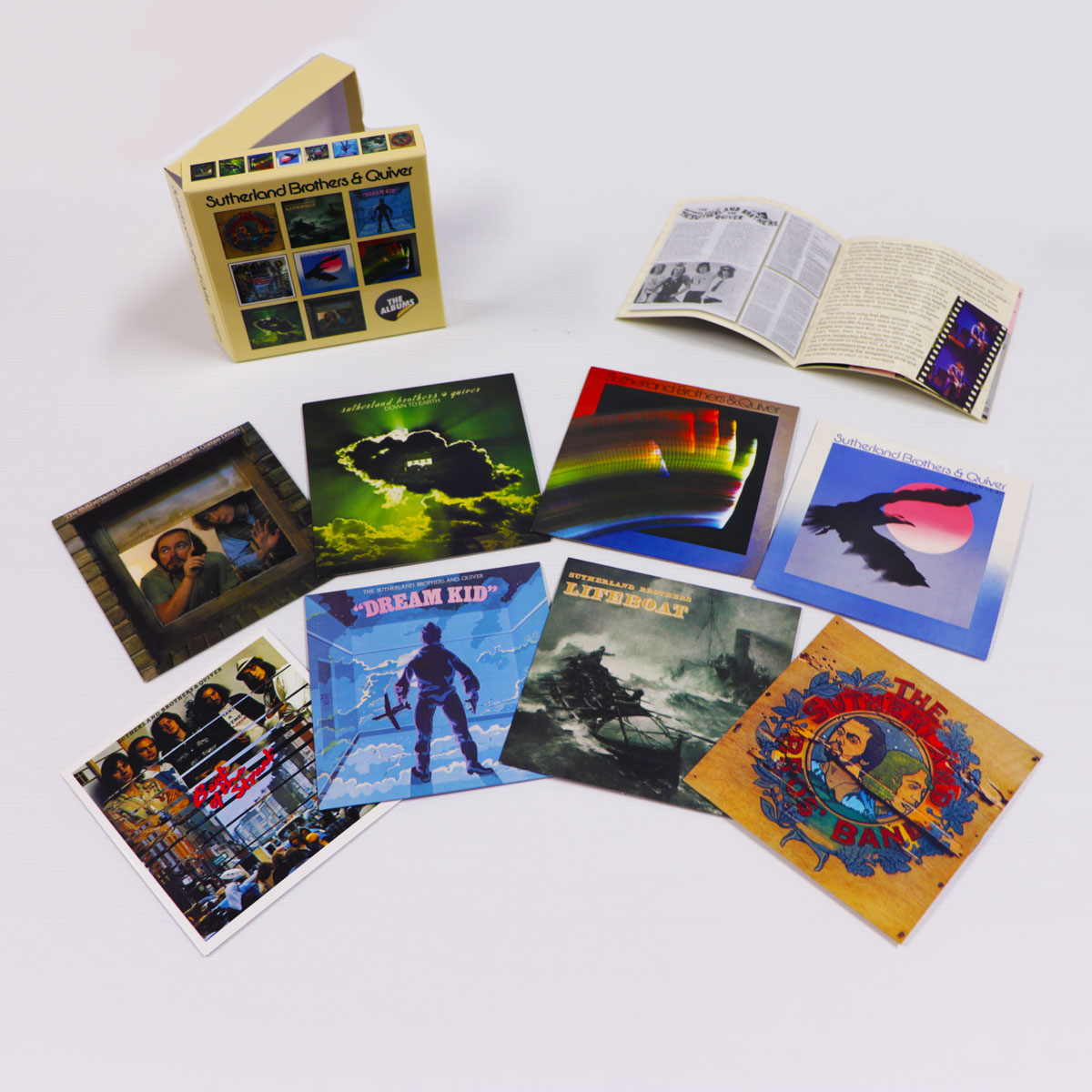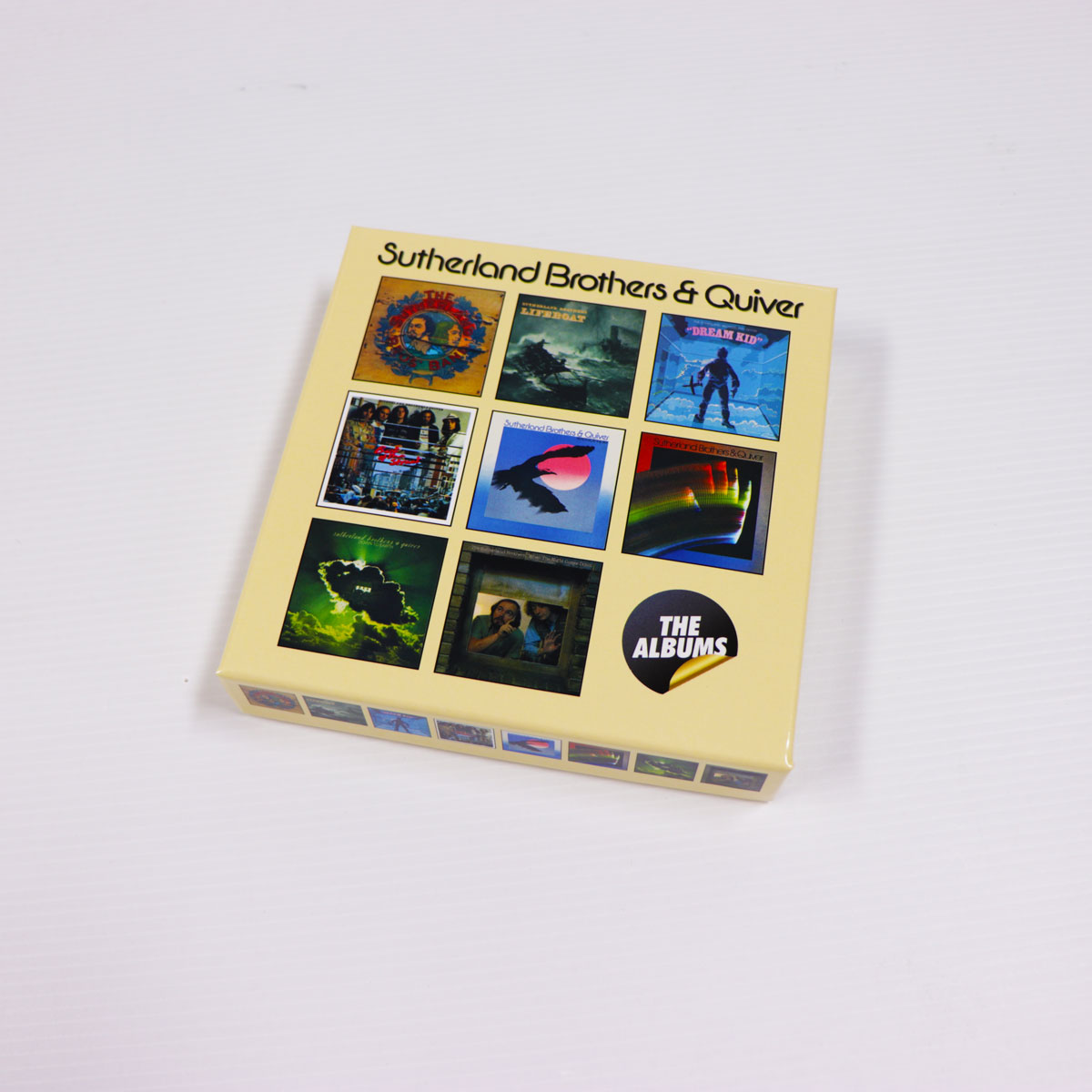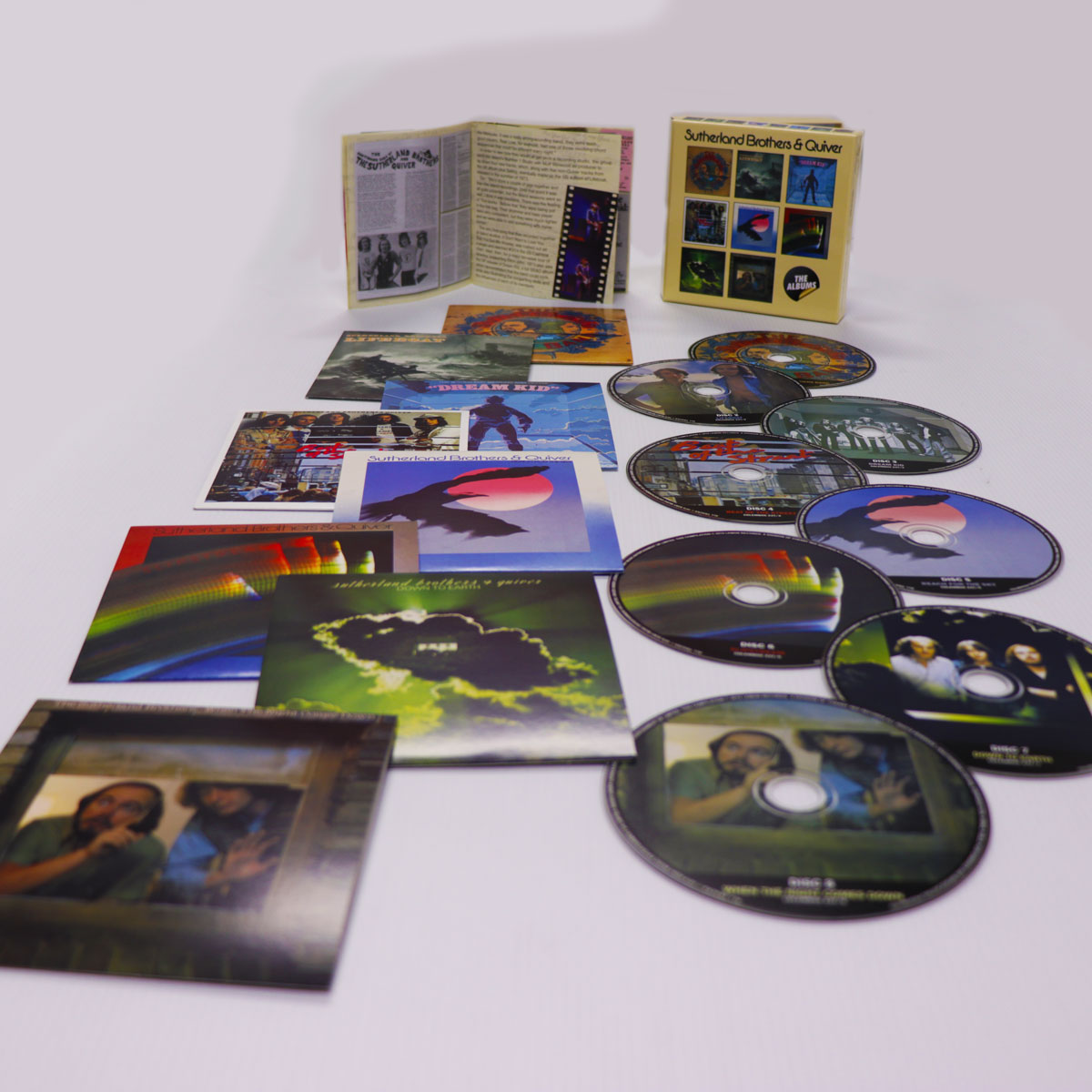Sutherland Brothers & Quiver ‘The Albums’ (2019)
The history of rock music is filled with artists who were incredible songwriters but lacked instrumental prowess and others who were amazing performers but were not as strong at writing original material. There is the occasional union formed by a group composed of talented composers joining forces with a band that was top notch at performing tunes written by others. One excellent example was the marriage of the Sutherland Brothers (Iain and Gavin) Band with Quiver, led by guitarist Tim Renwick, keyboard player Peter Wood and drummer Willie Wilson.
‘The Albums’ compiles all eight albums released by the Sutherland Brothers, with and without Quiver, between 1971 and 1979, on eight CDs, and does an incredible job of setting straight the confusing history of the recordings, doing an incredible service to fans of 1970’s rock by putting the efforts of the two entities into context, a most admirable effort which should be greatly respected and appreciated, thanks to project coordinator Mark Brennan and music historian Brian Mathieson who contributes the wonderfully informative essay that accompanies the box set.
“The Sutherland Brothers & Quiver produced some of the finest rock music of the 1970’s”

The Sutherland Brothers Band’s first s/t LP was released in 1972 on Island Records. The folk-tinged delight, with brothers Iain and Gavin Sutherland on guitars and vocals joined by bassist Kim Ludman and drummer Neil Hopwood, failed to click with record buyers despite containing such gorgeous tunes as ‘Hallelujah’ ‘Midnight Avenue’ and ‘The Pie’ the last which became the group’s debut single and its failure to sell, like the rest of the album, was not due to lack of songwriting talent on the part of Iain or Gavin Sutherland. The album, and live performances by the quartet, did make evident a lack of instrumental prowess. Island A & R man Muff Winwood was made aware of a Scottish group who appeared to suffer from the reverse problem, giving inspired performances of weaker original material. Winwood attended a performance by vocalist Cal Batchelor, guitarist Tim Renwick, keyboardist Peter Wood, bassist Bruce Thomas and drummer Willie Wilson, a quintet by the name of Quiver. After introductions and a few practices it became apparent that a joining of the two bands would be in the best interests of both. The Sutherland Brothers Band had finished recording the tracks for their sophomore effort ‘Lifeboat’ even as the brothers had entered the studio with Quiver and produced four finished songs including the classic ‘(I Didn’t Want To Love You But) You Got Me Anyway’ which when released as a single in the US reached #20 on the Cashbox charts. Presented with a conundrum the Sutherland Brothers’ second album was released in two versions, the UK LP containing the original tracks, while the US version was a mixture of five Sutherland Brothers tunes used on the UK version, the four tracks recorded with Quiver, and the non-LP single side ‘Sailing’ a tune that would later become a huge hit for Rod Stewart. The net result was a new band with considerable personnel changes and a new sound heard first on the US release of ‘Lifeboat’ which came considerably later than the UK LP due to the inclusion of the songs recorded with Quiver. As for personnel changes, Quiver vocalist Batchelor exited, as did Sutherland Brothers Band bassist Ludman and drummer Hopwood. The new ensemble consisting of the Sutherland brothers, Renwick, Wood, Thomas and Wilson took on the apt new name, the Sutherland Brothers & Quiver, and thus began an incredible musical marriage that would produce some of the finest rock music of the mid 1970’s, but along with the wonderful music came a confusing chronology of issue dates as well as the US success of the followup to ‘Lifeboat’ resulting in the band’s fourth album not being released in the US at all. Thus, the success enjoyed by the Sutherland Brothers & Quiver came at quite a cost and may well have affected the band’s momentum in the US and confused their following in the UK.

1973 brought the first album recorded completely by the Sutherland Brothers & Quiver, ‘Dream Kid’ consisting of ten tracks penned by Iain and Gavin Sutherland and featuring the guitar work of Tim Renwick which became the signature sound of the band. The LP documented the fact that SB&Q as the band became known were able to rock with the best. In addition, Renwick’s guitar gave new life to old Sutherland Brothers Band songs such as ‘Real Love’ one of the ‘Lifeboat’ tracks recorded without Quiver, when played live. Among the highlights of ‘Dream Kid’ was ‘I Hear Thunder’ whose title was an analogy of Renwick’s affect on the band’s sound. The album also included a gorgeous medley of two unfinished Gavin Sutherland tracks ‘Seagull’ and ‘Lonely Love.’ While the album did not have a hit single, the quality of songwriting and instrumental performances made it a good seller in the US. Unfortunately, since ‘Lifeboat’ had been released months later in the US than in the UK, the same was true of ‘Dream Kid’ and when the record label was ready for a UK follow up it was hesitant to issue ‘Beat Of The Street’ simultaneously in the US not wanting to disturb the sales of ‘Dream Kid.’ Additionally the band saw more personnel changes as bassist Bruce Thomas left a week before ‘Dream Kid’ was to be recorded. Tex Comer of Ace stepped in to play bass on the LP but returned to Ace after recording was done with Gavin Sutherland taking over on bass. According to Renwick, Ace’s hit ‘How Long’ was written about Comer’s involvement in SB&Q, with Paul Carrack’s lyrics “all your friends and their fancy persuasions” referred to the 100 pounds per week Comer was paid for recording ‘Dream Kid.’ In the end Bruce Thomas would go on to join Elvis Costello’s Attractions.
‘Beat Of The Street’ recorded in 1974 was filled with clever lyrics and punned titles by the quintet of the Sutherland brothers, Renwick, Wood and Wilson. Beyond the wonderful music found on the LP it is notable for two reasons, it did not see US release and it was the last recorded with keyboard player Peter Wood, who took time between SB&Q recordings to join Renwick in touring with Al Stewart in 1975. At the end of the tour Wood remained in the US and became part of Stewart’s band, co-writing the world-wide hit ‘Year Of The Cat’ with Stewart while Renwick returned to the UK and rejoined Iain, Gavin and Willie in a new four piece version of SB&Q that would record two more albums. As for ‘Beat Of The Street’ one of the highlights was the group’s second take on ‘Annie’ a tune which had first been released as a single with Supertramp’s John Helliwell on saxophone during the ‘Lifeboat’ period. This second version was much heavier with Renwick’s guitar front and center. Another highlight was ‘Saviour In The Rain’ released as a single and combining a fine commercial hook written by Iain Sutherland with the tasty guitar work of Renwick. What a shame that US music buyers were only afforded an opportunity to purchase ‘Beat Of The Street’ as an import as it may have gone a long way in increasing the following the band was building up in the States in the wake of ‘Lifeboat’ and ‘Dream Kid.’ Sadly we will never know the answer to that question although SB&Q were far from done as a working unit and had two more full albums featuring Tim Renwick yet to come.

The first fruit of the new quartet was 1975’s ‘Reach For The Sky’ released on the group’s new label, CBS and produced by Ron and Howie Albert, known for their work with The Easybeats. The LP’s first single ‘Ain’t Too Proud’ featuring Pink Floyd’s David Gilmour on pedal steel guitar failed to hit, but the followup ‘Arms Of Mary’ was a Top 10 UK hit and also charted highly in other countries such as the Netherlands. At the same time Rod Stewart’s cover of ‘Sailing’ became a huge international hit, and boosted sales of ‘Reach For The Sky’ internationally. The album also included ‘When The Train Comes’ a pop rock classic thanks to its commercial hook and Renwick’s guitar work, which was also released as a single although it failed to reach the heights of ‘Arms Of Mary.’ The hit single was a mixed blessing for the band as it made them into a much bigger act, capable of playing and filing bigger venues, but at the same time made their schedule much more hectic and brought added pressure from the label to record another hit single. The problem was the band, especially Renwick and Wilson, were talented players and they enjoyed the freedom working in tandem with the Sutherland brothers afforded them, giving them excellent material to perform, and a large increase in the number of paying gigs while the pressure from CBS, in search of a follow up hit single and the expectations of playing to much larger audiences resulted in a much less relaxed atmosphere surrounding the Sutherland Brothers & Quiver.
The last album recorded by the quartet of Iain and Gavin Sutherland, Tim Renwick and Willie Wilson was 1976’s ‘Slipstream.’ The LP did produce one last UK single chart hit in ‘Secrets’ but again, the song failed to match the success of ‘Arms Of Mary.’ The LP, however, was another solid piece of guitar driven pop rock thanks to the quality of the Sutherlands’ songwriting and Renwick’s instrumental performances. The title track in particular was a wonderful two and a half minute slice of pop rock that had real possibilities as a hit if it had seen single release. Instead CBS chose the three minute previously mentioned ‘Secrets’ with its gorgeous vocal harmonies and Renwick’s ever present guitar work. Sadly, the tune did not hit big, and Renwick left the band in 1977. He was not replaced, leaving only the Sutherlands and Wilson from the original SB&Q to record the band’s next album, although Renwick did appear as a guest.
‘Down To Earth’ released in late 1977 included appearances from many guests with Mick Grabham of Plastic Penny and Procol Harum as well as Renwick contributing guitar work, joined by such well known players as bassists Rick Wills of Small Faces and Foreigner and Andy Pyle of The Kinks, drummer/pianist Brian Bennett of The Shadows and ex-Moon drummer John Shearer. The LP contained several efforts at attaining the much wanted hit single although in the words of Iain Sutherland “I think, for me, when Tim left the band, SB&Q was more or less over. It was just Gav, Willie and I, and we did a tour with various add-on people. There was stuff going on with management that I was less and less happy with, so it came to a natural conclusion with CBS and everybody else. I liked the songs we did in LA, though. There were some great players, so I enjoyed doing the writing and recording.’ The album included three singles, although quite worthy efforts, ‘Ice In The Fire’ ‘Every Time I Cry’ and ‘Somebody’s Fool.’ The quality of the songs on ‘Down To Earth’ is good but it is evident that the band was in pursuit of a hit, and the LP lacks the cohesion of the group’s releases during the period when the personnel were stable. The album was the last to be credited to the Sutherland Brothers & Quiver, and was the final to feature Willie Wilson on drums, but Iain and Gavin Sutherland had one last album to release, albeit as a duo, on the CBS label.

Iain and Gavin Sutherland’s CBS swan song LP ‘When The Night Comes Down’ was released in 1979. Without Quiver the duo returned to their original folk rock sound. The album cover art featured the brothers gazing out a window, with Gavin appearing to wave goodbye. In fact Gavin always viewed it as something of a break-up LP, with many lyrics that suggested everything was all over. In Gavin’s words “I don’t think we set out to make our farewell album in some overt way, but it may be that our feelings came out in what was written in those songs-all a bit subliminal.” ‘Easy Come, Easy Go’ b/w ‘On The Rocks’ was an ideal single which sat the tone for the LP and for the group’s conclusion. In all six of the album’s eleven tracks saw single release, as ‘First Love’ b/w ‘Crazy Town’ and ‘’As Long As I’ve Got You’ b/w ‘I’m Going Home’ all saw release on 45’s, but none caught the record buying public’s attention and there were to be no more Sutherland Brothers albums following ‘When The Night Comes Down’ although Iain and Gavin have both done considerable solo recording over the ensuing years. As for Quiver, Peter Wood, as previously mentioned became a long time member of Al Stewart’s band beginning in 1975 and Tim Renwick returned to studio work, including periodic returns to Al Stewart, having recorded the memorable guitar solo on ‘Year Of The Cat’ the enormous hit Wood had co-written with Stewart. Renwick also toured and played with artists including Eric Clapton, Elton John and Mike & the Mechanics. Thus, there was much musical life remaining for all members of the Sutherland Brothers & Quiver after their dissolution.

‘The Albums’ gathers all eight of the Sutherland Brothers & Quiver recordings 1971-1979, one hundred and three total, including nineteen bonus tracks composed of non-LP singles and 7” edits. The discs come in min-LP sleeves contained in a clamshell box. The twenty eight page full-color booklet includes album and single art work, band photos and other memorabilia, and a detailed essay by Brian Mathieson. The music sounds better than ever thanks to the mastering job done by James Briggs. Although they may have not been a household name or sold millions of records, the Sutherland Brothers & Quiver produced some of the finest rock music of the 1970’s and thanks to Cherry Red Records’ Lemon Records imprint it is all to be found in ‘The Albums’ which will appeal to fans of folk rock, pop rock and classic rock, as well as anyone familiar with the work of guitarist Tim Renwick and the songwriting abilities of the Sutherland Brothers. It comes very highly recommended.
– Kevin Rathert
Sutherland Brothers & Quiver ‘The Albums’ (Lemon Records, 2019)




Decent Singer-Songwriter stuff. Nice to see them get the reissue treatment.
Im really pleased to be able to get these albums on cd.. Ive had 6 of them since the 70s, but only got the last”When The Night Comes Down” on cd.. Great music then, & still is now.